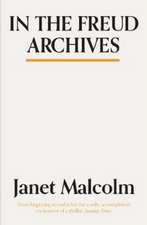The Analyst’s Vulnerability: Impact on Theory and Practice: Psychoanalysis in a New Key Book Series
Autor Karen J. Marodaen Limba Engleză Paperback – 20 iul 2021
Din seria Psychoanalysis in a New Key Book Series
- 5%
 Preț: 191.35 lei
Preț: 191.35 lei - 5%
 Preț: 219.54 lei
Preț: 219.54 lei - 5%
 Preț: 234.07 lei
Preț: 234.07 lei - 5%
 Preț: 226.26 lei
Preț: 226.26 lei -
 Preț: 275.46 lei
Preț: 275.46 lei - 5%
 Preț: 259.92 lei
Preț: 259.92 lei - 5%
 Preț: 296.12 lei
Preț: 296.12 lei -
 Preț: 244.88 lei
Preț: 244.88 lei - 5%
 Preț: 195.29 lei
Preț: 195.29 lei - 5%
 Preț: 379.45 lei
Preț: 379.45 lei - 5%
 Preț: 230.76 lei
Preț: 230.76 lei -
 Preț: 245.28 lei
Preț: 245.28 lei - 5%
 Preț: 253.66 lei
Preț: 253.66 lei - 5%
 Preț: 219.91 lei
Preț: 219.91 lei -
 Preț: 191.17 lei
Preț: 191.17 lei -
 Preț: 243.93 lei
Preț: 243.93 lei - 5%
 Preț: 233.47 lei
Preț: 233.47 lei - 5%
 Preț: 274.66 lei
Preț: 274.66 lei - 5%
 Preț: 331.07 lei
Preț: 331.07 lei - 5%
 Preț: 233.18 lei
Preț: 233.18 lei - 5%
 Preț: 162.03 lei
Preț: 162.03 lei - 5%
 Preț: 231.45 lei
Preț: 231.45 lei - 5%
 Preț: 259.92 lei
Preț: 259.92 lei - 5%
 Preț: 273.59 lei
Preț: 273.59 lei - 5%
 Preț: 233.69 lei
Preț: 233.69 lei - 5%
 Preț: 1013.91 lei
Preț: 1013.91 lei - 5%
 Preț: 243.98 lei
Preț: 243.98 lei - 5%
 Preț: 278.54 lei
Preț: 278.54 lei - 5%
 Preț: 317.21 lei
Preț: 317.21 lei - 12%
 Preț: 330.99 lei
Preț: 330.99 lei - 12%
 Preț: 938.70 lei
Preț: 938.70 lei - 5%
 Preț: 457.36 lei
Preț: 457.36 lei -
 Preț: 477.40 lei
Preț: 477.40 lei - 17%
 Preț: 238.23 lei
Preț: 238.23 lei -
 Preț: 379.75 lei
Preț: 379.75 lei - 5%
 Preț: 413.98 lei
Preț: 413.98 lei - 11%
 Preț: 275.64 lei
Preț: 275.64 lei - 5%
 Preț: 379.60 lei
Preț: 379.60 lei -
 Preț: 399.79 lei
Preț: 399.79 lei - 5%
 Preț: 1413.95 lei
Preț: 1413.95 lei -
 Preț: 385.88 lei
Preț: 385.88 lei - 5%
 Preț: 362.63 lei
Preț: 362.63 lei
Preț: 244.56 lei
Nou
46.80€ • 48.68$ • 38.64£
Carte disponibilă
Livrare economică 24 martie-07 aprilie
Livrare express 07-13 martie pentru 22.55 lei
Specificații
ISBN-10: 1032040831
Pagini: 226
Dimensiuni: 156 x 234 x 15 mm
Greutate: 0.33 kg
Ediția:1
Editura: Taylor & Francis
Colecția Routledge
Seria Psychoanalysis in a New Key Book Series
Locul publicării:Oxford, United Kingdom
Public țintă
Postgraduate, Professional, and Professional Practice & DevelopmentCuprins
Introduction Part I The Analyst as a Person 1. The analyst¿s early experiences 2. Managing the analyst¿s needs 3. The analyst¿s narcissistic vulnerability Part II The Analyst as Clinician 4. Conflict and negative countertransference 5. Deconstructing enactment 6. Myths about empathy and mirror neurons 7. Therapeutic action Conclusion
Recenzii
"As one of the leading relational thinkers of our time, no one has tackled the subject of the analyst’s vulnerability as deftly and thoroughly as Karen Maroda. By examining what is often unspoken, undisclosed, and secret in the clinician’s life and consulting room, she opens up a permissible space to discuss and critique how the analyst’s early childhood experiences impact one’s intrapsychic and interpersonal development. Through a brave new expedition into psychoanalytic honesty, Maroda examines how we both sacrifice and gain from our therapeutic relationships. She astutely reminds us that good analytic work must include effective emotional engagement and authentic relatedness as an ethical expression of being." —Jon Mills, PsyD, PhD, ABPP, Postgraduate Programs in Psychoanalysis & Psychotherapy, Adelphi University; author ofDebating Relational Psychoanalysis.
"Central to the human condition and often a motivating factor in choosing to become a psychoanalyst, until now, the clinician’s vulnerability has largely been neglected in the literature. In this beautifully written volume, Karen Maroda corrects for that by exploring the numerous ways in which analyst fragility, sensitivity and other expressions of humanity directly impact psychoanalytic treatment. Breaking new ground and generously illustrated with clinical examples throughout, this important book deserves a central spot in every psychotherapist’s library, regardless of theoretical orientation." - Dr. Steven Kuchuck, President, International Association for Relational Psychoanalysis and Psychotherapy, Author, The Relational Revolution in Psychoanalysis and Psychotherapy, Editor, Clinical Implications of the Psychoanalyst’s Subjectivity
Notă biografică
Karen J. Maroda, PhD, ABPP, is a psychologist/psychoanalyst in private practice in Milwaukee, Wisconsin and Assistant Clinical Professor of Psychiatry at the Medical College of Wisconsin. She is the past ethics chair and a board member of Division 39 (Psychoanalysis) of the American Psychological Association and past president of Division 39's Section III, Women, Gender, and Psychoanalysis. She is also a Fellow of the American Psychological Association and the American Academy of Psychoanalysis. She is the author of three previous books, The Power of Countertransference, Seduction, Surrender, and Transformation, and Psychodynamic Techniques. Dr. Maroda has also published numerous journal articles, book chapters, and book reviews. She lectures nationally and internationally on the therapeutic process, including the place of affect, self-disclosure, countertransference, legitimate authority, and the need for clinical guidelines. Dr. Maroda is on the editorial board of two major journals, Psychoanalytic Psychology and Contemporary Psychoanalysis, and she actively encourages her colleagues to write and talk about what they do as therapists.
Descriere
This book examines the analyst's experiences and traits, demonstrating the impact they have on theory-building and technique. Arguing that choice of theory and interventions are unconsciously shaped by clinicians' early experiences, this book argues for greater self-awareness, self-acceptance and open dialogue as a corrective.
Linking the analyst's early childhood experiences to ongoing vulnerabilities reflected in theory and practice, this book favors an approach that focuses on feedback and confrontation, as well as empathic understanding and acceptance. Essential to this task are analysts' motivations for doing treatment and the gratifications they naturally seek. Maroda asserts that an enduring blind spot arises from clinicians' need to deny what they are personally seeking from the analytic process, including the need to rescue and be rescued. She seeks to remove the guilt and shame associated with these motivations, encouraging clinicians to embrace both their own humanity and their patients', rather than seeking to transcend them. Providing a new perspective on how analysts work, this book explores the topics of enactment, mirror neurons and therapeutic action through the lens of the analyst's early experiences and resulting personality structure. Maroda confronts the analyst's tendencies to favor harmony over conflict, passivity over active interventions, and viewing the patient as an infant rather than an adult.
Exploring heretofore unexamined issues of the psychology of the analyst or therapist offers the opportunity to generate new theoretical and technical perspectives. As such, this book will be invaluable to experienced psychodynamic therapists and students, as well as teachers of theory and practice.





















